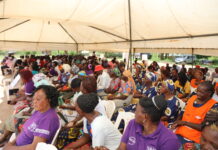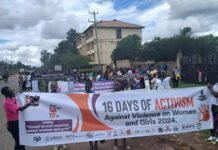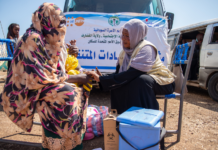By Okong’o Oduya

“life is nolonger enjoyable in foreign land as a refugee. Here in Kenya , we go through many challenges. With no stable income generating activities, no husbands and family structures to help look after our families, we struggle to make ends meet .”A woman refugee in Nakuru narrates.
women from South Sudan living in Nakuru , carry tales of struggles ,their tribulations are an indication that all has never been well for them since the day they crossed in Kenya for refuge.
Under the leadership of Elizabeth Ayak Atemi as the chair of the group, the team narrates their journey to the camp, Nakuru and Kenya in general.
According to them, life in Kakuma refugee camp was and is not appealing, the situation in camp was wanting. With little food, poor medical services and lack of proper learning institutions forced them to ask to be allowed to reside outside the camps to seek these services in other towns.
Mrs. Jasline Dudu Wani a spokesperson of the team says they could not continue staying in the camp.Life in the camp was becoming harder and harder. “We could no longer manage the situation in kakuma. Without food , health services and other social amenities such as education forced some of us to seek to be allowed to operate from other towns ‘down country’ to seek for the services,” she said
“People in the camp starve, the climate is hostile with children to look after and who need education it was hard for us to continue living there. We asked UNHCR to allow us operate from other towns in Kenya .” She noted.
They were given alien identification cards by the agency and relocated to Nakuru. They use these cards to identify themselves when they move around the town and the country in general.
Though the cards help them move around with ease and freedom they say the cards have not been of much relevant to them when seeking for an employment in Kenya. They cannot secure work permit in Kenya using the card and that to them is another challenge they have to cop up with.
As a way to earn a living the group has embarked on handwork as a way of earning income to feed, educate their families as well as paying their bills.
The chairperson Dudu Wani says they make decorated bed sheets, make traditional bangles and washing detergents sell them for income.
“With every effort we put in place to feed ourselves we have to admit it is hard for us. Getting market of our product in Kenya is nil .”
“The best example is these bed sheets; there is no market here in Kenya. How many people in Kenya will buy one bed sheet at a price of sh35, 000? Very few. That means we have to source our market from abroad and may be few people back at home who are paying dowry, which is hard .” Says the group adviser Hellene Amach.

She says sometimes they supply their products to the buyer but they take long time to pay the money which destabilizes them financially.
“Imagine a situation you send a product to the buyer and takes three or four months to pay the money yet there are needs you are required to meet ,it becomes a challenge,” She noted.
Since the war broke out in south Sudan more than thirty years ago, Kenya became a safe landing place for thousands of south Sudan citizens. The liberation war between south Sudan and Khartoum government left thousands of people dead millions displaced.
Kakuma refugee camp in Turkana County was their second home for years as they waited for peace to be restored back in their home county for them to go back.

In Nakuru town alone there are four thousand registered refugees but it is believed the current number is more than eleven thousand South Sudan refugees residing here.
After the liberation South Sudan became a free state in 2011 when the state delinked herself from Khartoum few years later after independence the country has continuously been fighting. The rift between the president Salver Kiir and his deputy Riek Machar in 2013 worsened the situation in the troubled nation. The war between the supporters of the leaders and the rebels made life in the state a total disaster for the citizens in the country.
They moved to Kenya, Kakuma camp to be exact where they stayed for years before they were allowed by United Nation Human Rights Commission to live outside the camps due to one reason or another. This according to them was the last time they ever received financial assistance from the international agencies.














